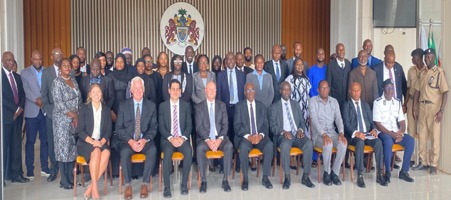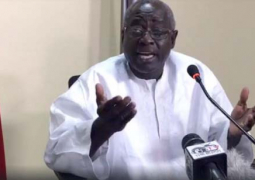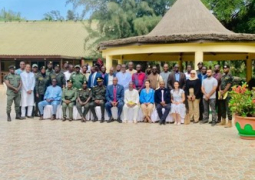
The discussion centered on the expected enactment and implementation of provisions related to plea bargaining within the criminal justice process.
Chief Justice Hassan B. Jallow stated the importance of coming together with other law enforcement officers from other jurisdictions to share their experiences on plea bargaining.
The Chief Justice emphasised reviewing certain provisions, examining them in light of experiences from other jurisdictions, identifying challenges, and applying solutions from those experiences to better prepare and equip for the implementation of the law when it comes into force.
CJ Jallow expressed appreciation to the Ministry of Justice and Law Enforcement for their initiative in ensuring that for the first time, our criminal procedure code includes provisions on plea bargaining.
“It comes in the context of the judiciary’s efforts to re-establish and maintain the court-connected PTR (Plea and Trial Review) system,” CJ added.
Professor Danny DeWalt, vice president and chief of staff of Pepperdine University, said they were present was to share the decades of experience on the issue of plea bargaining.
“What we have learned over the last 10 years of seeking to implement plea bargaining principles has been astounding,” Prof DeWalt stated.
He also shared the experienced they had over 10-year case study of working in Uganda in every prison across the country under the leadership of the Chief Justice in partnership with the Director of Public Prosecution, prisons, police and the bar and all departments collaborating together.
He added that whether they were going to a common law or a civil law system, the plea bargaining principles were the same, but the application and the integration needed to be customised for each country to make it work for their system, to make it work for their traditions, to make it work for their culture.
Police Commissioner Abdoulie Sanneh explained the significance of the workshop, saying it could not be over emphasised.
Commissioner Sanneh said plea bargaining offers a more efficient way to resolve cases, reducing the burden on the courts, while still ensuring justice is served.
He added that plea bargaining allows prosecutors and defence counsel to negotiate an agreement, leading to a quicker resolution for both victims and defendants.
“This is a progressive step that will help alleviate the heavy caseloads in our justice system and enable the swift delivery of justice,” Commissioner Sanneh said.
Present at the event was Hussein Thomasi, the Solicitor General of the Gambia who also emphasised the importance of stakeholders from different jurisdictions sharing their experiences on the issue of plea bargaining.
He highlighted that such exchanges are crucial for enhancing the effectiveness of legal systems, as they allow countries to adopt best practices and tailor them to their unique legal frameworks.
Thomasi further noted that collaboration across jurisdictions can lead to more consistent and fair outcomes, improving justice delivery and strengthening public confidence in the legal process.




